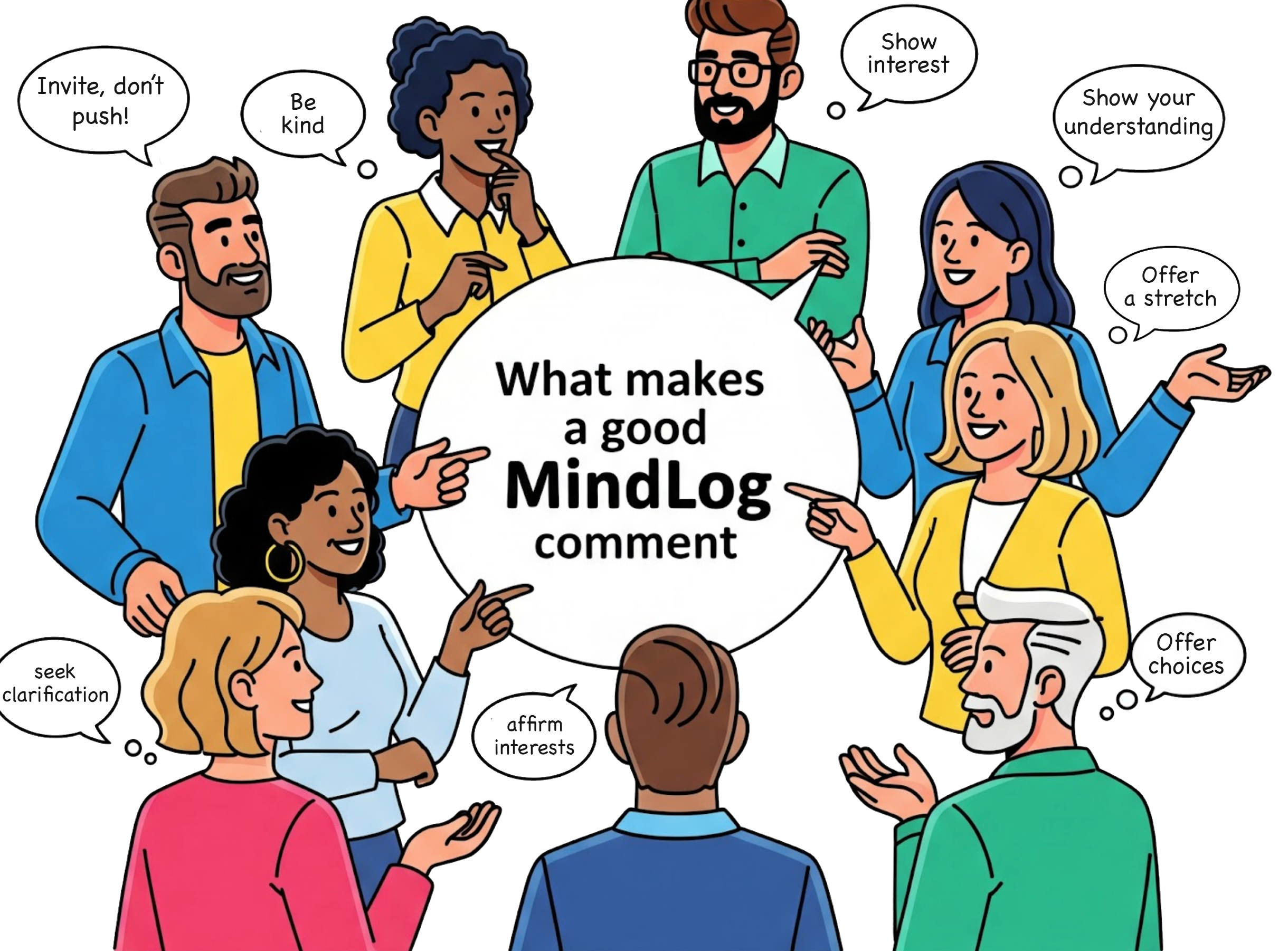Effective commenting in MindLog

Feel free to contact us with your reflections on MindLog comments.
We'll use them to further develop the information on this page.
General guidelines
Typical approach
- Avoid commenting on accuracy. MindLog is not about correctness.
- Use the Mindlogger’s language. Avoid introducing new concepts or vocabulary.
- Be specific. Comments should be focused in a way that demonstrates your interest in and recognition of the Mindlogger.
- One tried and true way to begin is by describing what you like about an entry. “I like what you said about telling a story through dialogue. I could see how you applied this idea, especially when the character, Julie, was talking.”
- You could also begin by showing the Mindlogger how you’re understanding the gist of their reflection. “It looks like you’re thinking that anger might not always be something to avoid.” I need to think about that.
- If you are an educator, try to identify a tiny stretch point or growth edge and frame it as something you’d like to know more about or understand better. “Daniel’s character didn’t come across as much as Julie’s, but I did find myself wanting to get to know him better.” Or “The way you are thinking about magic seems pretty complicated. It would be interesting to see you unpack the concept a little more.”
- It's okay to comment on more than one aspect of an entry, or ask more than one question, but don’t overdo it. People are more likely to reflect or act on a single comment or question than they are to several comments or questions in a row.
Basic characteristics
The best MindLog comments:
- Beguile rather than push,
- Invite rather than demand, and
- Demonstrate or test your understanding.
Peer comments
When you’re commenting as a peer it’s best to think of the writer as a colleague. Here are a few guidelines:
Don’t correct the Mindlogger. Instead, it’s helpful to check on your understanding or acknowledge that you may not fully understand:
- If I’m reading your reflections accurately…
- I’m not sure I fully understand, do you mean [X]?
- If I understand correctly, I think the experience you describe is a lot like [something you have personally experienced].
Express interest:
- I find [X] interesting. I've experienced something similar…
- That bit about boating got my interest…
Seek clarification:
- I’d love to know more about what you mean by [X].
- I have a feeling there is something important about the way you connected [idea with idea] and would like to know more about how you got there.
- [Idea] is one I wrote about this week too. I’m looking forward to finding out if you think we’re heading toward similar conclusions [in the next class, when you read my reflections, etc.].
Make occasional suggestions (the fewer and smaller the better). Mostly suggest micro practices you have found helpful or offer another perspective to chew on:
- I was struggling with something similar a couple of weeks ago and found it helpful to [X].
- A [short statement or practice] in [resource name] at [specific location], helped me when I was [learning, grappling] with [X].
- I think we are looking at this from different perspectives. The way I was thinking about it was [X]. Your thoughts?
Educator comments
All of the techniques described above work for educators just as well as they work for peers, In fact, when you’re commenting as an educator it can be helpful to think of the Mindlogger as a mentee rather than a student. Here are a few additional guidelines:
Most of the time, the Mindlogger should be able to act on at least one aspect of your suggestion(s) with minimal outside help.
As a mentor, you can get away with making stronger suggestions than a peer could, but don’t overdo it. For example, instead of setting an assignment, you can test the waters by dangling a carrot.
- You seem to be interested in [X]. [Name], and [Name] find it interesting too. Let me know if you might like to team up with them for [project or event].
- It looks like you may be pushing ahead a bit too quickly on your project. Is it time for another planning session?
Because educators have access to growth charts, they can use the comments field to help students learn to interpret changes in their growth trajectories.
- I’ve noticed that your Lectical Scores have been a bit lower this term. If you’re surprised by or concerned about these changes, please let me know. I’d be happy to chat.
- I’ve noticed a repeating pattern in your growth over the years. Do you see one too?